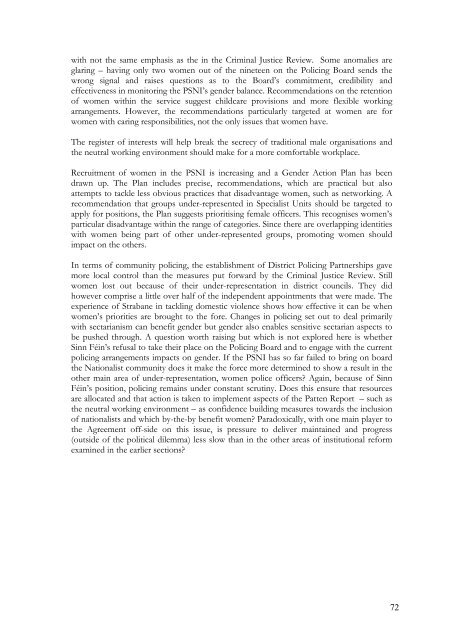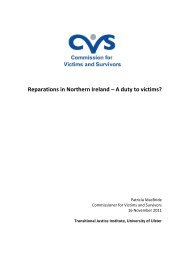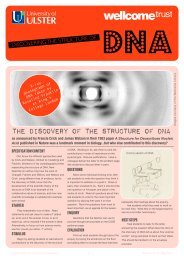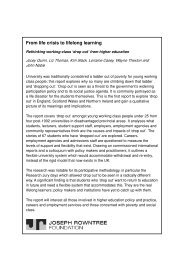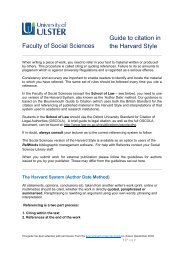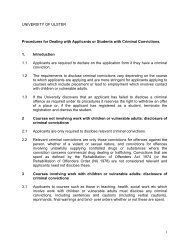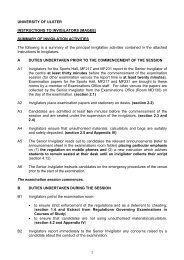Agreement Reached in the Multi-Party Negotiations - Transitional ...
Agreement Reached in the Multi-Party Negotiations - Transitional ...
Agreement Reached in the Multi-Party Negotiations - Transitional ...
Create successful ePaper yourself
Turn your PDF publications into a flip-book with our unique Google optimized e-Paper software.
with not <strong>the</strong> same emphasis as <strong>the</strong> <strong>in</strong> <strong>the</strong> Crim<strong>in</strong>al Justice Review. Some anomalies are<br />
glar<strong>in</strong>g – hav<strong>in</strong>g only two women out of <strong>the</strong> n<strong>in</strong>eteen on <strong>the</strong> Polic<strong>in</strong>g Board sends <strong>the</strong><br />
wrong signal and raises questions as to <strong>the</strong> Board’s commitment, credibility and<br />
effectiveness <strong>in</strong> monitor<strong>in</strong>g <strong>the</strong> PSNI’s gender balance. Recommendations on <strong>the</strong> retention<br />
of women with<strong>in</strong> <strong>the</strong> service suggest childcare provisions and more flexible work<strong>in</strong>g<br />
arrangements. However, <strong>the</strong> recommendations particularly targeted at women are for<br />
women with car<strong>in</strong>g responsibilities, not <strong>the</strong> only issues that women have.<br />
The register of <strong>in</strong>terests will help break <strong>the</strong> secrecy of traditional male organisations and<br />
<strong>the</strong> neutral work<strong>in</strong>g environment should make for a more comfortable workplace.<br />
Recruitment of women <strong>in</strong> <strong>the</strong> PSNI is <strong>in</strong>creas<strong>in</strong>g and a Gender Action Plan has been<br />
drawn up. The Plan <strong>in</strong>cludes precise, recommendations, which are practical but also<br />
attempts to tackle less obvious practices that disadvantage women, such as network<strong>in</strong>g. A<br />
recommendation that groups under-represented <strong>in</strong> Specialist Units should be targeted to<br />
apply for positions, <strong>the</strong> Plan suggests prioritis<strong>in</strong>g female officers. This recognises women’s<br />
particular disadvantage with<strong>in</strong> <strong>the</strong> range of categories. S<strong>in</strong>ce <strong>the</strong>re are overlapp<strong>in</strong>g identities<br />
with women be<strong>in</strong>g part of o<strong>the</strong>r under-represented groups, promot<strong>in</strong>g women should<br />
impact on <strong>the</strong> o<strong>the</strong>rs.<br />
In terms of community polic<strong>in</strong>g, <strong>the</strong> establishment of District Polic<strong>in</strong>g Partnerships gave<br />
more local control than <strong>the</strong> measures put forward by <strong>the</strong> Crim<strong>in</strong>al Justice Review. Still<br />
women lost out because of <strong>the</strong>ir under-representation <strong>in</strong> district councils. They did<br />
however comprise a little over half of <strong>the</strong> <strong>in</strong>dependent appo<strong>in</strong>tments that were made. The<br />
experience of Strabane <strong>in</strong> tackl<strong>in</strong>g domestic violence shows how effective it can be when<br />
women’s priorities are brought to <strong>the</strong> fore. Changes <strong>in</strong> polic<strong>in</strong>g set out to deal primarily<br />
with sectarianism can benefit gender but gender also enables sensitive sectarian aspects to<br />
be pushed through. A question worth rais<strong>in</strong>g but which is not explored here is whe<strong>the</strong>r<br />
S<strong>in</strong>n Fé<strong>in</strong>’s refusal to take <strong>the</strong>ir place on <strong>the</strong> Polic<strong>in</strong>g Board and to engage with <strong>the</strong> current<br />
polic<strong>in</strong>g arrangements impacts on gender. If <strong>the</strong> PSNI has so far failed to br<strong>in</strong>g on board<br />
<strong>the</strong> Nationalist community does it make <strong>the</strong> force more determ<strong>in</strong>ed to show a result <strong>in</strong> <strong>the</strong><br />
o<strong>the</strong>r ma<strong>in</strong> area of under-representation, women police officers? Aga<strong>in</strong>, because of S<strong>in</strong>n<br />
Fé<strong>in</strong>’s position, polic<strong>in</strong>g rema<strong>in</strong>s under constant scrut<strong>in</strong>y. Does this ensure that resources<br />
are allocated and that action is taken to implement aspects of <strong>the</strong> Patten Report – such as<br />
<strong>the</strong> neutral work<strong>in</strong>g environment – as confidence build<strong>in</strong>g measures towards <strong>the</strong> <strong>in</strong>clusion<br />
of nationalists and which by-<strong>the</strong>-by benefit women? Paradoxically, with one ma<strong>in</strong> player to<br />
<strong>the</strong> <strong>Agreement</strong> off-side on this issue, is pressure to deliver ma<strong>in</strong>ta<strong>in</strong>ed and progress<br />
(outside of <strong>the</strong> political dilemma) less slow than <strong>in</strong> <strong>the</strong> o<strong>the</strong>r areas of <strong>in</strong>stitutional reform<br />
exam<strong>in</strong>ed <strong>in</strong> <strong>the</strong> earlier sections?<br />
72


